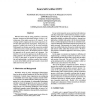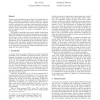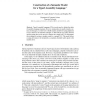30 search results - page 2 / 6 » Using Dependent Types to Certify the Safety of Assembly Code |
ICFP
2006
ACM
14 years 4 months ago
2006
ACM
I report on an experience using the Coq proof assistant to develop a program verification tool with a machine-checkable proof of full correctness. The verifier is able to prove me...
WETICE
2000
IEEE
13 years 9 months ago
2000
IEEE
With the advent and the rising popularity of networks, Internet, intranets and distributed systems, security is becoming one of the major concerns in IT research. An increasing nu...
POPL
2000
ACM
13 years 8 months ago
2000
ACM
Various code certification systems allow the certification and static verification of important safety properties such as memory and control-flow safety. These systems are valuabl...
ICFP
2005
ACM
14 years 4 months ago
2005
ACM
Proof-carrying code (PCC) is a general framework that can, in principle, verify safety properties of arbitrary machine-language programs. Existing PCC systems and typed assembly l...
VMCAI
2004
Springer
13 years 10 months ago
2004
Springer
Typed Assembly Languages (TALs) can be used to validate the safety of assembly-language programs. However, typing rules are usually trusted as axioms. In this paper, we show how to...



